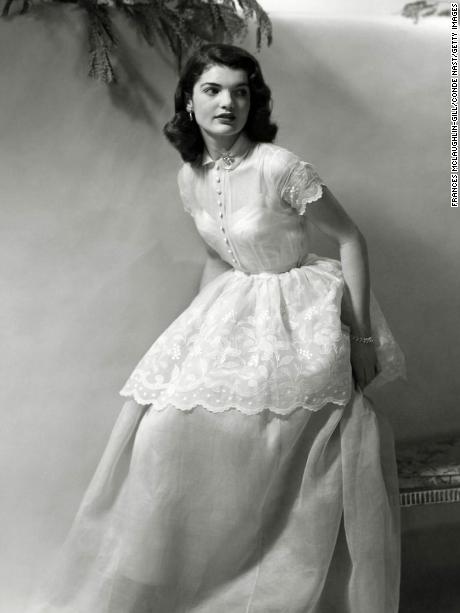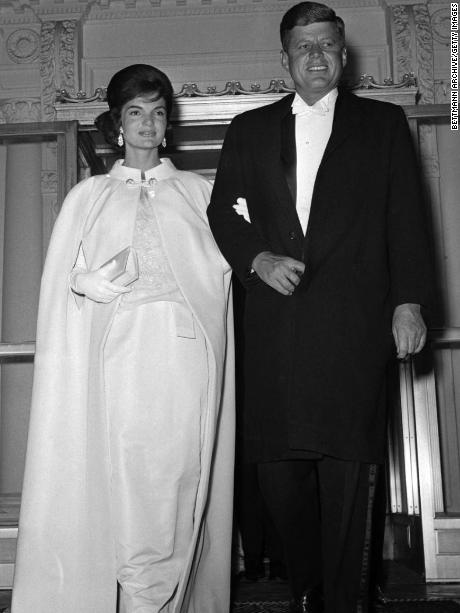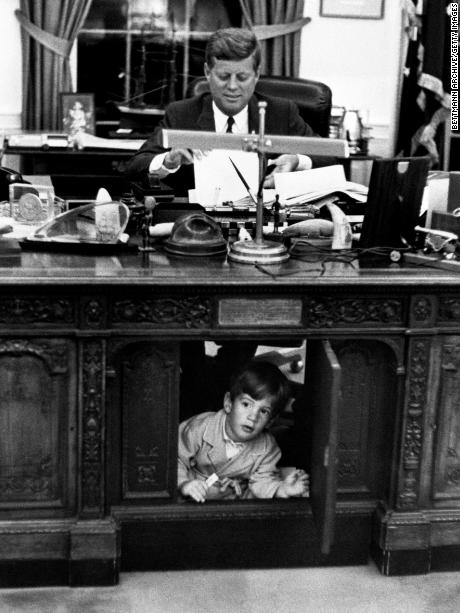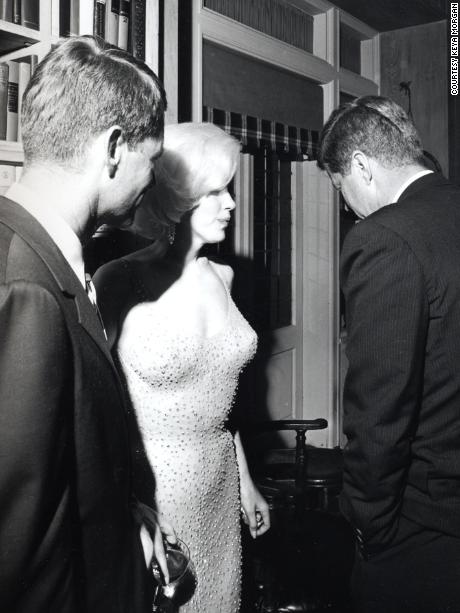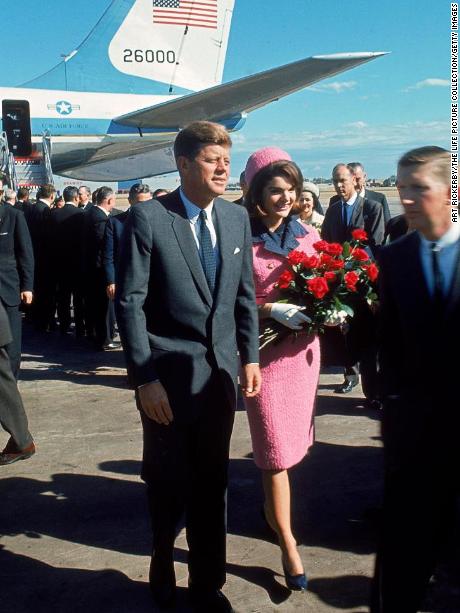In a private letter Kennedy sent to a friend before John F. Kennedy’s inauguration, she wrote: “I would describe Jack as rather like me in that his life is an iceberg. The public life is above the water — and the private life is submerged.”
In the second episode of “First Ladies,” CNN’s new series profiling six women who’ve held the position, we get a deeper look at one of the most famous first ladies in American history.
The Kennedys lived in the White House for a little more than a thousand days, from January 20, 1961 until shortly after JFK’s assassination on November 22, 1963. It was then that the country needed Jackie Kennedy most, and she did the unimaginable, bravely soldiering on with two young children by her side. When we look beyond Camelot at the real story of Jacqueline Kennedy, we see a complex woman who is both vulnerable and powerful, insecure and independent.
And in this episode, we see her like we’ve never seen her before. Below, we’re breaking down 11 of our favorite moments and key takeaways from “First Ladies: Jackie Kennedy.”
Table Of Contents
- 1 1. The Miss Porter’s connection
- 2 2. Great style ran in the family
- 3 3. She almost didn’t attend the inaugural ball
- 4 4. She didn’t want her kids in the spotlight
- 5 5. History overlooks her intelligence
- 6 6. She knew about JFK’s affairs … and had a secret friend of her own
- 7 7. She was one of JFK’s top advisers
- 8 8. She valued privacy, but often had to grieve in public
- 9 9. We won’t see that pink suit for decades
- 10 10. She planned JFK’s funeral from the plane
- 11 11. She shouldn’t be underestimated
1. The Miss Porter’s connection
Kate Andersen Brower: Hi Kate! Here we are with the second episode, about a woman who may be the most identifiable and celebrated FLOTUS in history. I still can’t believe Jackie was only 31 when she became first lady.
Kate Bennett: It’s incredible to think about.
Miss Porter’s has a few big-name alumnae, but Jackie is probably the most well known. It’s the ONE thing I have in common with Jackie Kennedy. 🙋🏻♀️
Brower: I didn’t know that, how posh!
During JFK’s campaign Jackie actually thought she was a liability because of her background; she said people saw her as “a snob from Newport who had bouffant hair and had French clothes and hated politics.”
That all changed once she became first lady, of course; the world fell in love with her.
2. Great style ran in the family
Bennett: Jackie’s dad was such a handsome man. He had a very bad drinking habit and was plagued by scandals and gossip, which was so humiliating for Jackie and her sister, Lee. But they both adored their dad.
I personally think Jackie got her style instincts from “Black Jack,” who was always just turned out — impeccably tailored suits and pocket squares and French cuffs. He always wore the looks, the looks didn’t wear him — I like to think Jackie understood that and carried it on.
Kate! You’re in this one!
Brower: OK, I was eight months pregnant when I was interviewed! 🤰🏻
Bennett: The foremost expert!
And whoa, 1,200 people at Jackie’s wedding reception? I feel like maybe it was a harbinger of what was to come for her as FLOTUS: All of the people who wanted to meet her, to be like her, who wanted a piece of her. She was one of those women who had a natural gift to draw others to her.
Brower: I know. She’s so interesting because I think, as a country, we felt envious of her beauty, money and marriage to the President — but later, once the fault lines in her marriage were revealed, we felt deeply sorry for her.
Bennett: Definitely. To be honest, I sometimes think that’s how it is for most first ladies.
Brower: I think you’re right. One thing that was so unique to me about Jackie, though, was her style.
Bennett: We can’t overstate the influence Jackie had on American fashion; she probably had thousands and thousands of copycats.
The real person responsible for her looks was her couturier Oleg Cassini, who was also one of her closest confidants. Cassini created the suits and matching hats; the gowns; the A-line dresses with the boatnecks and double-faced satin … he was really a genius. He once said about the White House years, “All I remember about those days are nerves, and Jackie on the phone (saying) ‘Hurry, hurry, Oleg, I’ve got nothing to wear.'” I just love the thought of Jackie stressing over her outfits, because publicly it was so the opposite.
She also had a big hand in the design of her inaugural gown, that spectacular dress and cape and opera-length evening gloves. It was difficult to tell under the layers of chiffon, but the beading was so detailed — it was sewn by hand with silver thread.
3. She almost didn’t attend the inaugural ball
Brower: This video of her inauguration is incredible. She’d just had a cesarean two months before this, giving birth to John Jr.
Bennett: I did not know that she didn’t make it through all the inauguration ceremonies! What a great detail.
Brower: She was so exhausted on the night of the inauguration that she actually called the President’s physician to give her Dexedrine so she could make it to the first ball.
On their way, JFK told their driver to turn on the lights inside the car “so that people can see Jackie.” William Walton, a Kennedy family friend, remembered that they made her sit forward so people could have a better view. She was under so much pressure, and she somehow still managed to look flawless.
As a mother of a baby myself, I think it was unfair to her, and it set such an unattainable standard for women. It shows how culturally first ladies are supposed to be everything to everyone, all at the same time: the perfect wife, the perfect mother and a dutiful diplomat. Of course, she had no choice at the time — and lots of medication at her disposal.
Bennett: OK, explain her whispery voice to me. Is it intentional?
Brower: It is a little Ivanka-esque to me.
4. She didn’t want her kids in the spotlight
Brower: Oh, I love these shots of Caroline and John F. Kennedy Jr. playing in the Oval Office; there’s that famous photo of JFK Jr. sticking his head out of the front of the Resolute desk.
Jackie was such a wonderful mother. I talked to one White House worker who said she was so involved in her children’s lives that she even asked him to add blocks to the pedals of the tricycle that Caroline got for Christmas because her legs weren’t yet long enough to reach them. She had the bandwidth to remember something like that while serving as first lady.
Bennett: So interesting, too, the decision to let your kids be in the public eye. Ivanka Trump puts hers out there, Melania would never. 🤷🏻♀️
That’s actually something Melania has in common with Jackie as a first lady; Jackie didn’t want her kids to be in the spotlight, either. She said she wanted them to have as normal a childhood as possible.
5. History overlooks her intelligence
Brower: I ❤️ this CBS interview in the White House showing how she restored a lot of its history. Fantastic footage! She opened up the White House to millions of Americans who would never be able to visit it in person. It was very egalitarian of her, which is interesting because she came from such a wealthy family.
Bennett: Millions of people watched this special. She was so iconic, and I think she knew it. But she still wasn’t confident, smoking and drinking to calm her nerves. I kind of love the human aspect of knowing that about her.
Brower: Me too! 🍷
Bennett: Haha! She understood so well that people love the little details, the history, the stories — buying back furniture and antiques from past presidencies. She was a journalist after all!
Brower: “People tended to underestimate her intelligence.” Hmmm, when have we seen that before?!? I think almost every first lady gets this treatment.
Bennett: Exactly!
6. She knew about JFK’s affairs … and had a secret friend of her own
Bennett: Jackie had a secret male friend!! What!?? I didn’t know that; this is so juicy!
Brower: Oh I know! Dr. Frank Finnerty. Good for her, right?
It’s amazing that Jackie waited FOUR weeks to accept Jack’s marriage proposal. I wonder if she knew what she was really getting into.
Bennett: Adventure + danger = so hard to resist in a man.
Brower: Can you imagine what she had to put up with? All the blatant cheating. It always fascinated me that the press kept it a secret. It was an open secret, really, but out of respect for Kennedy and the presidency it wasn’t reported at the time. I think that even surprised some of Kennedy’s friends.
Bennett: Awful. I can’t imagine. The stress must have been unbearable. He had this extensive apparatus of Secret Service to keep his secrets and some of the women were White House staffers — so it was all happening right under her nose at times. None of these stories are new, but it’s still shocking to have the hindsight of knowing there were serious cracks in this “great American marriage” storyline.
And to say that if she divorced him she would have ended his political career — wow. What the times were like then!
Brower: MARILYN!!!!
Bennett: Amazing!
Brower: Marilyn’s dress when she sang “Happy Birthday” to the President!!!! Completely transparent 😳
Bennett: And cut to Jackie escaping from it all with horseback riding. These casual looks were just as great as her formal ones, IMHO — the capri pants and polo tops, T-shirts and white denim. SO American iconic. Every woman wanted that ease of being casual and chic and here’s this great role model for that blend of high and low style. That reminds me a lot of Michelle Obama.
7. She was one of JFK’s top advisers
Brower: This time in history, the Cuban Missile Crisis, has always fascinated me; there was a real fear that a nuclear war would start with the White House as the prime target. Jackie told her husband, “I want to die with you, and the children do, too.” To hear that in her own words is chilling, and also so full of devotion.
Bennett: He always seems to come back to her; that’s the real power of their marriage. I always find it compelling in marriages where there has been infidelity to see the perseverance of the spouse who was cheated on, like Jackie was. She must have somehow known that their bond was ultimately too strong to throw away. It says a lot about the kind of person she was.
Brower: If Jackie had divorced him, I don’t think he would have become president. I think that’s the case with most of the modern presidents — without their wives they would never have risen to the pinnacle of American politics.
My favorite part of this Cuban Missile Crisis story — aside from a nuclear war not starting — was the fact that Jack gave Jackie a Tiffany sterling silver calendar of those 13 days. It had her initials engraved next to his, “J.B.K.” and “J.F.K.” She wept when he gave it to her; all of his top advisers received one, and she was one of them even though she didn’t have that title.
8. She valued privacy, but often had to grieve in public
Bennett: This is so sad when they lose their third baby, Patrick; for something as private as losing a premature baby to be so public. “Jackie only saw Patrick in an incubator.” It’s heartbreaking. 😭
You just can’t not acknowledge the inherent legacy of tragedy in the Kennedy family. Long, long ago I used to freelance for George magazine – I DREAMED of meeting JFK Jr.
Brower: God, I wish JFK Jr. had lived. I absolutely think he would have become president one day.
9. We won’t see that pink suit for decades
Brower: The tragedy of this is also that their happiest days were after Patrick’s death, and shortly before JFK’s assassination in 1963. The pink suit!
Bennett: That chunky bouclé knit; it’s unforgettable!
Brower: It was a replica of a Chanel suit; she needed to be seen wearing American-made clothing. The National Archives actually has the suit, but it won’t be made public for decades.
Bennett: Really?? I had no idea!
Brower: Not until at least 2103, per Caroline Kennedy. I think it’s too fresh and painful. I can see why she’d make that decision; I mean, the suit looks brand new, according to an archivist. And still has the blood stains on it.
Bennett: Incredible. Jackie must have just been stunned. In shock.
Brower: I can’t imagine what she went through. She saw her husband murdered in the most gruesome way imaginable.
Bennett: And then she wouldn’t change clothes: “I want them to see what they’ve done to Jack.” What bravery!
10. She planned JFK’s funeral from the plane
Brower: The fact that she had the ability to plan the funeral on the flight back — what strength.
I interviewed Jim Ketchum, the White House curator she spoke to from the plane, and he was stunned by how she was able to hold herself together so quickly after seeing her husband killed. She immediately thought of her husband’s favorite president, Abraham Lincoln, and said JFK’s funeral should be exactly like his. And it was.
Ketchum told me that on the day of the ceremony, he got a phone call from her around 6:30 a.m. to ask about a small detail: There was a French painting in the Yellow Oval Room of the White House where high-level dignitaries would be, and Jackie was worried they’d see it. She told Ketchum she’d “really like to have something more American to share,” and asked him to replace the painting ASAP.
That attention to detail when her life had been torn apart amazes me. Even in the midst of her grief, Jackie understood history and the incredible weight of that moment.
Bennett: Whenever we’re in a hold for an event at the White House, or on our feet for a long time to cover something, I always, always think about that history. Like, this is where JFK’s casket entered. This is where his body lay in state. This is where Jackie mourned. … It’s powerful to really be in the building and think about all that came before.
Brower: Exactly. It’s so iconic. I interviewed residence staff who described being ashamed of crying in front of Jackie because she wasn’t crying. They turned their back to her as JFK’s casket was in the White House. They wanted her to have privacy and a chance to say goodbye.
Of course, this moment haunted her for the rest of her life. She is the epitome of stoicism.
Bennett: I never forget that monumental history. Sounds cheesy, but I really think about what has happened in these spaces and the legacy left behind. There was such an aspirational draw to the Kennedys, and it was so brilliant of her to tap into that with the comparison to Camelot after JFK died: “There will be great presidents again, but there will never be another Camelot.”
11. She shouldn’t be underestimated
Brower: Don’t you think that’s her greatest strength, the way she invented Camelot as a legacy for her husband? She understood the power of the media.
Bennett: Literally, genius. And we think Trump is good at branding! He has nothing on Jackie. 😁
Brower: So true! 🤣
I’m so glad this episode ends with Jackie’s letter to Khrushchev. She recognized that one of her husband’s greatest triumphs was breaking through to Soviet Premier Khrushchev and saving the world from nuclear war, and her letter to him after JFK’s death shows just how smart she was.
“While big men know the need for self-control and restraint — little men are sometimes moved more by fear and pride.” She knew that she could influence the US-Soviet relationship at a critical time. She was a fashionista, but also an intellectual; a diplomat and a historian in her own right.
Bennett: She’s one of those women who knew to see the way people underestimated her as a strength, not a weakness.
She probably loved when people underestimated her — it’s much more fun and rewarding in the end when you prove them wrong!
Brower: 💪 It’s such a fascinating episode. She’s so complex and you’re right, her beauty often belied her intellect.
Next up, Nancy Reagan. Another very smart and very savvy woman.
Bennett: Can’t wait!
